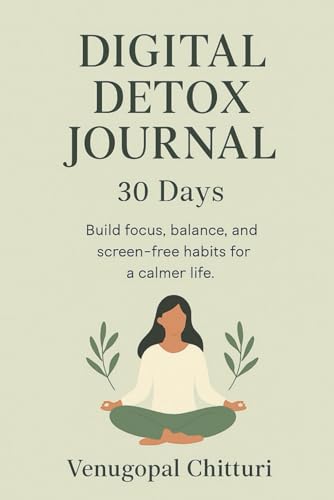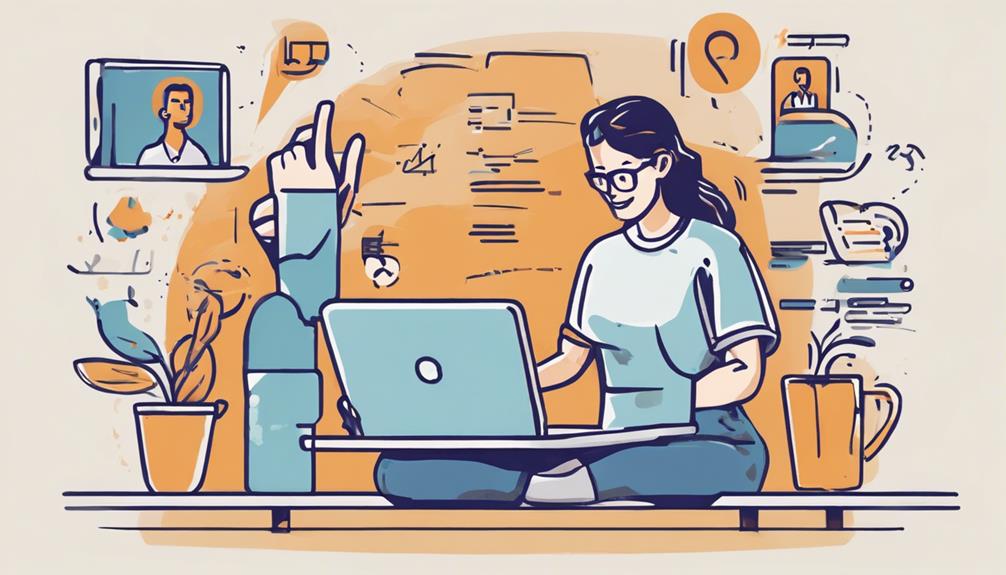If you’re feeling socially exhausted, recognize the signs like irritability, fatigue, or withdrawal. Set clear boundaries and communicate your limits to protect your energy. Prioritize self-care through mindfulness, hobbies, and digital detoxes. Surround yourself with supportive people and seek help if needed. Developing healthy habits, managing digital overload, and practicing relaxation techniques can boost your resilience. Keep exploring more ways to safeguard your mental health as you learn how to effectively cope with social fatigue.
Key Takeaways
- Recognize signs of social exhaustion like irritability, fatigue, or withdrawal to manage stress effectively.
- Set clear boundaries and communicate them assertively to prevent burnout and protect mental health.
- Prioritize self-care and digital detoxes to reduce overload and foster emotional resilience.
- Engage in community activities and seek support when feelings of overwhelm or hopelessness arise.
- Incorporate mindfulness, relaxation techniques, and healthy habits to build resilience against social fatigue.

Retrospec Sedona Zafu Meditation Cushion with Buckwheat Hull Fill – Adjustable Yoga & Pilates Equipment Support – 17in Crescent Cotton Cover
NATURAL COMFORT & SUPPORT: Filled with sustainable buckwheat hulls, this meditation cushion elevates your practice by aligning your…
As an affiliate, we earn on qualifying purchases.
As an affiliate, we earn on qualifying purchases.
Recognizing the Signs of Social Exhaustion

Social exhaustion can sneak up on you, especially when you push yourself to keep up with constant social demands. You might notice feelings of irritability, fatigue, or even anxiety creeping in after social interactions. Recognizing these signs early helps you build emotional resilience, so you can better handle social stress. If you feel drained even after small gatherings, it’s a clear sign you need a social detox—time to step back and recharge. Pay attention to your body’s signals; trouble concentrating, mood swings, or a desire to withdraw are common indicators of social exhaustion. Incorporating practices like self-care routines can help mitigate feelings of burnout and protect your mental health. By acknowledging these signs, you take the first step toward protecting your mental health and regaining your energy. Remember, listening to yourself is key to maintaining balance.

Digital Detox Journal – 30 Days: Build focus, balance, and screen-free habits for a calmer life
As an affiliate, we earn on qualifying purchases.
As an affiliate, we earn on qualifying purchases.
Setting Boundaries to Protect Your Energy

To protect your mental health, it is crucial to recognize your limits and honor them. Clearly communicating your boundaries helps others understand what you can and can’t take on. When you set these limits, you preserve your energy and maintain your well-being. Incorporating sound design techniques such as layering sounds and creating a calming ambient soundscape can also promote a sense of tranquility and help you manage social fatigue more effectively.
Recognize Your Limits
Recognizing your limits is essential for protecting your mental health, especially when it comes to setting boundaries that preserve your energy. Developing emotional awareness helps you identify when you’re reaching your capacity and experiencing stress. By tuning into your feelings, you can notice signs of overwhelm before they escalate. Effective stress management involves understanding what drains you and adjusting your commitments accordingly. When you acknowledge your limits, you prevent burnout and maintain mental resilience. Remember, it’s okay to decline tasks or social invitations when you feel stretched too thin. Setting these boundaries isn’t about avoiding connection; it’s about safeguarding your well-being so you can engage more intentionally and sustainably. Incorporating elements of self-care, such as mindful pauses and relaxation techniques, can further support your mental health. Recognizing your limits empowers you to protect your energy and nurture your mental health.
Communicate Clearly Boundaries
Once you understand your limits, the next step is to communicate those boundaries clearly to others. Effective communication is essential for setting boundaries that protect your mental health. Be direct and specific about what you need and what you can or cannot do. Use “I” statements to express your feelings and avoid blame, which encourages understanding rather than defensiveness. Remember, boundary setting isn’t about pushing others away; it’s about preserving your energy and well-being. Consistency is key—reinforce your boundaries regularly and confidently. Clear communication helps others respect your limits, reducing social fatigue. Trust in your ability to advocate for yourself, and don’t hesitate to remind people of your boundaries when needed. This proactive approach supports your mental health and fosters healthier relationships. Incorporating techniques from Intelligent Tutoring Systems (ITS) can also help you develop personalized strategies for managing social interactions effectively.

Self Care Gifts for Women Get Well Soon Gift Baskets for Women Thinking of You Gifts for Women Spa Gift Baskets for Women Self Care Kit for Women Relaxation Gifts Box for Women Care Package for Women
Self Care Package for Women: This luxurious self-care gift set is designed to make the most special women…
As an affiliate, we earn on qualifying purchases.
As an affiliate, we earn on qualifying purchases.
Prioritizing Self-Care and Personal Time

Prioritizing self-care and personal time is essential for maintaining your mental health amid life’s demands. Taking time for yourself helps recharge your emotional resilience and reduces social fatigue. To do this effectively, consider these strategies:
Prioritize self-care to boost resilience and reduce social fatigue for better mental health.
- Practice mindful journaling to process your thoughts and emotions, fostering clarity and calmness.
- Dedicate time to solo hobbies that bring you joy, such as reading, painting, or walking, to reconnect with yourself.
- Schedule regular breaks in your daily routine to pause, breathe, and reset, preventing burnout.

Magicteam White Noise Machine with 20 Non Looping Natural Soothing Sounds Memory Function 32 Levels of Volume Powered by AC or USB and Sleep Sound Timer Therapy for Baby Kids Adults Black
❤20 Non-Looping Sleep Sounds: White noise ,Brown noise, pink noise, blue noise, fan,brook, rain, ocean,bird and Bonfire,suitable for…
As an affiliate, we earn on qualifying purchases.
As an affiliate, we earn on qualifying purchases.
Managing Social Media and Digital Overload

To protect your mental health, you need to set clear digital boundaries and limit your social media use. Curating the content you consume helps reduce unnecessary stress and distractions. Taking control of your digital habits can make a significant difference in how you feel daily. Additionally, choosing dog names that suit your personality can provide a comforting and grounding presence amidst digital overload.
Setting Digital Boundaries
Managing your digital life means setting clear boundaries to prevent social media and screens from overwhelming you. Start with a digital detox by designating tech-free times each day, like during meals or before bed. Establish online etiquette by being respectful and mindful of others’ boundaries, which helps reduce unnecessary stress. Limit notifications to stay focused and avoid constant interruptions. Use apps or device settings to restrict your screen time and set specific hours for social media use. These boundaries protect your mental health and create space for real-life connections. Remember, managing digital overload isn’t about complete avoidance but about creating a healthy balance that keeps you grounded.
Key strategies:
- Schedule regular digital detox periods
- Set boundaries for social media engagement
- Limit notifications and screen time
Curating Content Consumption
Have you ever felt overwhelmed by the endless stream of content on social media? If so, it’s time to start practicing content curation. Instead of passively scrolling, intentionally select the accounts and topics that truly add value to your life. Unfollow or mute sources that cause stress or negativity, creating a healthier digital environment. Remember, you don’t have to consume everything; quality beats quantity. Incorporate regular digital detoxes to give yourself space from constant notifications and information overload. Setting boundaries around your content consumption helps preserve your mental clarity and reduces social fatigue. By actively managing what you see, you regain control over your digital experience and protect your mental health from unnecessary noise. **Utilizing content curation tools effectively can further personalize your digital environment and reduce overload.**
Creating a Supportive Social Environment

Creating a supportive social environment is essential for maintaining good mental health, as strong relationships and understanding communities provide emotional safety and resilience. When you engage in community activities, you foster connection and reduce feelings of isolation. Peer support plays a critical role, offering empathy and shared experiences that help you navigate social fatigue. To build this environment, consider these steps: 1. Participate in community engagement events to strengthen your social ties. 2. Seek out peer support groups where you can share and learn from others. 3. Offer your support to friends and neighbors, creating a reciprocal network of care. Additionally, understanding the importance of social bifurcation helps in recognizing how varying social environments impact mental well-being.
Incorporating Relaxation and Mindfulness Practices

Incorporating relaxation and mindfulness practices into your daily routine can considerably boost your mental well-being. Start with simple mindfulness exercises, like focusing on your breath or paying attention to your surroundings. These practices help ground you and reduce feelings of social fatigue. Relaxation techniques such as deep breathing, progressive muscle relaxation, or guided imagery can quickly ease tension and calm your mind. Dedicate a few minutes each day to these activities, especially during stressful moments or after social interactions. Consistency is key; over time, you’ll notice improved resilience and a greater sense of calm. By intentionally practicing mindfulness and relaxation, you create a mental refuge that supports your overall mental health and helps you navigate social fatigue more effectively. Additionally, incorporating sound healing techniques can amplify your relaxation efforts by promoting deep states of calm and balance.
Developing Resilience Through Healthy Habits

Building resilience to mental health challenges often starts with adopting healthy habits that support your physical and emotional well-being. Incorporate mindfulness techniques into your daily routine to stay present and reduce stress. Focus on emotional regulation by recognizing and managing your feelings instead of suppressing them. Consistent healthy habits strengthen your ability to cope with social fatigue and setbacks. Here are three effective strategies:
Building resilience begins with daily mindfulness, emotional regulation, and regular physical activity.
- Practice daily mindfulness exercises to improve focus and reduce anxiety.
- Develop emotional regulation skills, like deep breathing or journaling, to handle overwhelming feelings.
- Prioritize regular physical activity, which boosts mood and resilience over time. Additionally, understanding the importance of evidence-based insights can help you make informed choices to support your mental health.
Knowing When to Seek Professional Help

Even with healthy habits in place, there are times when managing mental health requires more support. If you notice persistent feelings of overwhelm, hopelessness, or social fatigue that interfere with daily life, it’s time to contemplate seeking professional help. Therapy options like counseling or psychotherapy provide tailored strategies to cope effectively. Recognize signs such as drastic mood shifts, difficulty functioning, or thoughts of self-harm. Don’t hesitate to explore mental health resources, including support groups or hotlines, for immediate assistance. Knowing when to seek help isn’t a sign of weakness; it’s a proactive step toward recovery. Understanding mental health care can empower you to take the necessary steps toward healing. Reaching out to mental health professionals can offer the guidance and tools you need to navigate social fatigue and protect your overall well-being.
Frequently Asked Questions
How Can I Tell if Social Fatigue Is Affecting My Physical Health?
If social fatigue affects you, you’ll notice stress symptoms like irritability, difficulty concentrating, or muscle tension. You might also experience an energy decline, feeling unusually tired even after rest. Pay attention to how your body responds after social interactions—if you feel overwhelmed or drained, it could be a sign. Recognizing these signs early helps you manage your mental health better and prevent physical health issues linked to ongoing fatigue.
What Are Quick Strategies to Recharge During Social Burnout?
When you’re feeling social burnout, quick strategies can help you recharge. Try practicing mindfulness exercises to center yourself and reduce stress. Grab energy-boosting snacks like nuts or fruit to restore your energy levels. Take a few deep breaths or step outside for fresh air to clear your mind. These small actions can make a big difference, helping you feel more refreshed and ready to handle social situations with renewed energy.
How Does Social Fatigue Impact My Work Performance?
Like Icarus flying too close to the sun, social fatigue can cause your work performance to plummet. When your social boundaries blur, your focus suffers, and your work becomes less efficient. It disrupts your work-life balance, leading to burnout and decreased productivity. Recognizing this, you can set clear boundaries, prioritize tasks, and take breaks, ensuring your performance stays sharp without sacrificing your mental well-being.
Can Social Fatigue Lead to Long-Term Mental Health Issues?
Social fatigue can indeed lead to long-term effects on your mental health if left unaddressed. When you consistently feel drained from social interactions, it may contribute to anxiety, depression, or burnout over time. You might notice increased feelings of isolation or difficulty managing daily stress. To prevent these long-term issues, it’s essential to recognize your limits, practice self-care, and seek support when social fatigue starts affecting your well-being.
Are There Specific Foods That Help Alleviate Social Exhaustion Symptoms?
Ever wonder if certain foods can ease social exhaustion? You might find relief by eating nutrient-rich foods like leafy greens, nuts, and berries that support your brain and mood. Pair these with calming teas like chamomile or peppermint to help soothe your nerves. These natural options can help you recharge, reduce stress, and regain your energy after social interactions, making it easier to face your day.
Conclusion
Remember, ignoring social fatigue can turn your mental health into a ticking time bomb ready to explode. By recognizing signs, setting boundaries, and practicing self-care, you hold the power to defuse that bomb before it goes off. Prioritize your well-being like a superhero guarding their secret weapon. Don’t let social exhaustion turn your peaceful mind into a chaotic storm—take charge now, or risk being overwhelmed in a whirlwind of mental chaos!










